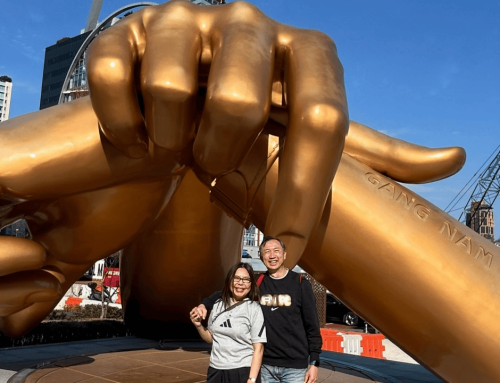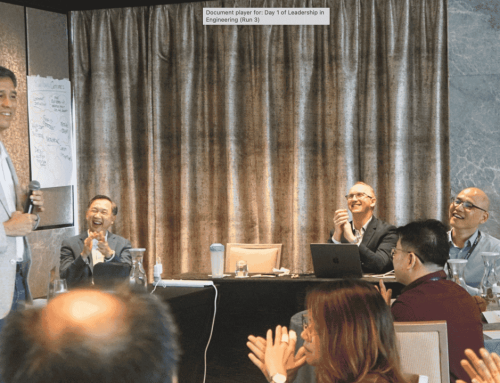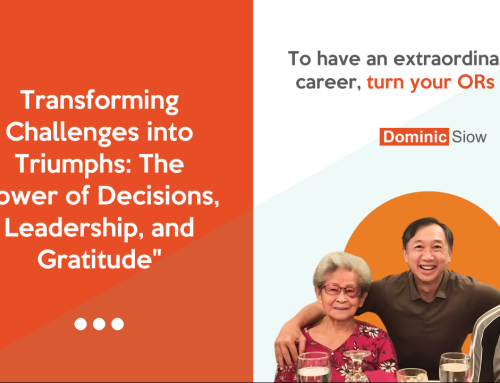

As professionals, we’re often asked, “What are the secrets to a long and fulfilling career?” After saying farewell to my neighbour and dear friend of 18 years, Captain Michael Ma, I found myself reflecting on this very question.
Captain Michael Ma lived to 99 years old. He was an extraordinary man who led a full and purposeful life, embodying traits that are just as essential for leaders and professionals today as they were throughout his remarkable journey.
Here are the three key traits he modeled that I believe can guide anyone toward a long, successful, and fulfilling career.
1. Self-Reliance
Michael Ma embodied self-reliance in a way that was both inspiring and unconventional. His determination to navigate life on his own terms reflects a key trait of high-performing professionals: the ability to take initiative, make independent decisions, and adapt to changing circumstances.
Born into humble beginnings in Guangzhou, China, he chose a path that many traditionalists in his culture would have avoided. He became a sailor, rising through the ranks to command merchant ships—a career that required long periods away from home, sacrificing time with his family to ensure they had a better future.
One of Michael’s proudest achievements was sending his son Paul to study in Australia as a teenager. This was no small feat for someone of his background and circumstances. It demonstrated his determination to make the most of what he had and his commitment to providing his family with the best opportunities available.
Emigrating to Australia after his retirement in 1979, Michael continued to live life on his own terms. His independence was evident in every aspect of his life. When his legs started to weaken in his 80s, he researched and bought a mobility scooter rather than rely on others. He scooted to the local shops, refusing offers of help from friends and family who offered to drive him.
Even as his mobility declined, he found ways to maintain his autonomy. He installed handrails in his garage to help himself get out of the car. When showering became difficult, he hired a carer to stand by in case he needed assistance—but insisted on washing himself. His philosophy was clear: why be a burden to others when you can still do it yourself?
2. Mastery and Growth
Michael embodied a lifelong commitment to mastery and growth, demonstrating that continuous learning and adaptability are crucial for long-term success in both life and career.
Even when mobility challenges arose, he continued to live life fully. He attended the New Year’s Eve fireworks, visited Canberra to enjoy the annual Floriade, and spent countless hours learning technology, mastering apps, and teaching others how to use them—all the way into his 90s.
Most people would have put these pursuits into the “too hard” or “why bother” basket, but not Michael. He embraced challenges with enthusiasm. When he learned that Sue and I had purchased an electric vehicle (EV), he asked if he could have a test drive! His curiosity and willingness to learn never diminished.
In a world that’s constantly evolving, this trait of continuous learning and growth is essential for professionals who want to stay relevant and excel in their careers.
3. Purpose and Contribution
Michael’s life was dedicated to serving his family in his own unique way, demonstrating how a sense of purpose and contribution aligns with effective leadership. Leaders who operate with a clear sense of purpose are more likely to build resilient, high-performing teams, inspiring those around them through their unwavering commitment.
Providing for his family was his purpose, and he pursued it with unwavering commitment. When his wife, Ophelia, developed dementia and suffered a stroke, he hired a carer to help provide the best care possible. Even when she was moved to a home, Michael insisted on visiting her regularly. He believed it was important for others in the home to see that Ophelia had people who loved her.
When Ophelia passed about three years ago, it was evident that his morale took a dive. The things that gave him so much fulfilment—self-reliance, mastery, and purpose—became harder to achieve. His hearing deteriorated, and he could only spend limited time on the computer each day before needing to rest.
Purpose gives meaning to our actions and motivates us to contribute to something bigger than ourselves. For leaders, this sense of purpose not only drives personal fulfillment but also inspires those they lead.
A Final Farewell
While I am sad that I will no longer see Michael’s cheery demeanor or be inspired by his independence as he navigated Moree Street on his motorised scooter, I am happy that he passed peacefully. On Christmas Day, he set sail on his next exciting voyage.
His life reminds us that impactful actions, rooted in self-reliance, growth, and purpose, can leave a lasting legacy for future generations of leaders to follow.
So, as we embark on our own journeys—both in life and in our careers—let us strive to model these three traits. They are not just keys to personal success but also the foundation for a long, fulfilling, and purposeful career.

Which of these traits resonates most with you? How do you model self-reliance, mastery, and purpose in your professional life?
I’d love to hear your thoughts in the comments!







Leave A Comment